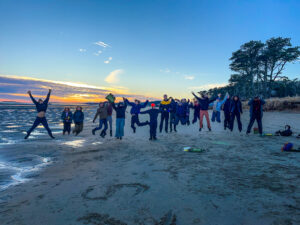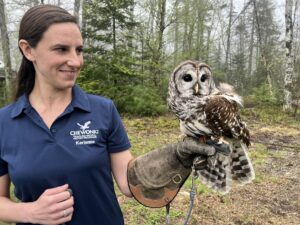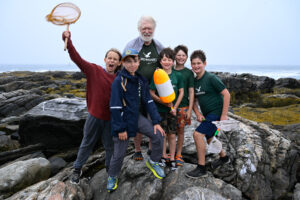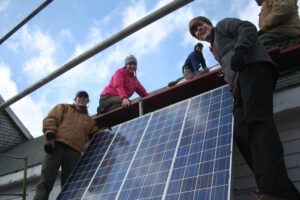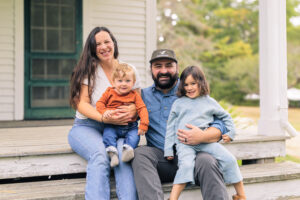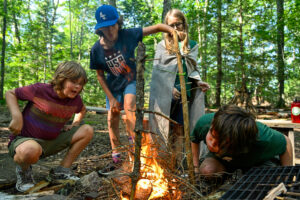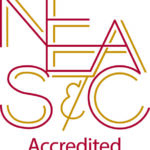There’s knot tying contests, arts & crafts, campfire singalongs, and penpals. It’s summer all right, but not like any summer Chewonki has seen before. That’s because, for the first time in 115 years, Camp Chewonki isn’t happening on Chewonki Neck, it’s happening in three hundred-plus households across the country. We wrapped up the second full week of Camp Chewonki@Home with a virtual campfire circle on Friday, and despite the physical distance, the event was just as joyful, irreverent, and meaningful as ever. Below we catch up with Emily Bell-Heorth and Charlie Fear, both Camp Chewonki directors, to learn the what, why, and how of Camp Chewonki@Home:
What was your reaction when you heard that camp would not be held in-person this summer?
EBH: I was full of mixed emotions. My initial reaction was a feeling of certainty – knowing that we were making a decision grounded deeply in our commitment to the health and well being of our campers and their families. It made me feel comforted to know that we could ensure that our community, both local and spread far and wide, would be safe this summer. Immediately following this sense of comfort came the pangs of sorrow and loss. Everything that we do, we do for our campers. Their joys, their challenges, their laughter, their sorrows are ours, and this summer has seemed comparatively empty without their presence.
CF: A mixture of sadness and relief. The first image that flashed through my mind when the communication to cancel camp went out were the faces of the familiar faces from last summer I would be missing and the new faces that I met at events or through video calls I wouldn’t be welcoming to Chewonki for their first summer. The campus is not the same without the voices of campers echoing through the woods and across the fields. At the same time, I was relieved that we had committed to placing the health and safety of our campers, our staff, and our local community first. I hear all the time how camp is more important than ever for kids right now, and it’s true. And that’s why we decided to create a remote camp program to maintain our connection to our families and staff.
Where did the idea for a remote camp experience come from?
EBH: So much of what Chewonki hopes to do for young people is to give them the tools to take what they learn at Chewonki and apply it to their home community. We wanted to give families the tools to make the kind joyful learning and connecting that happens at camp happen at home!
CF: As we began to plan for Camp Chewonki@Home, we spent a lot of time looking at how other camps and educational institutions were transitioning from in-person to remote experiences. We also reached out to our families to learn about the challenges they would be facing and how they felt we could support them. What we saw and heard was that kids were missing their friends and that after a spring of virtual school they were also fed up with Zoom. This helped to guide us towards a model that would minimize screen time as much as possible while also providing meaningful peer-to-peer connection. Ultimately, we have designed a program that gives campers the opportunity to choose how much or how little they want to participate.
What were the biggest challenges in terms of developing this experience?
EBH: A huge challenge was the time constraint of development. It wasn’t very much time to get the program ready for families. We were also challenged, because as camp educators, our expertise is in facilitating and creating in-person experiences, not remote or online ones. It has been a learning curve for us to try to translate what we do in person every summer at camp to a remote setting.
CF: One of the most valuable resources you can give an educator is time. The nature of this spring is that time was a finite resource. In a typical year, we spend September through the beginning of June planning and preparing for in-person camp. This year, we started planning and creating an entirely new camp program at the start of May, so 10 months of planning, logistics, and preparation was squeezed into a little under 2 months.
What are you most excited about?
CF: As educators, we are our most complete selves when we are interacting with our students, our campers. We have heard from many people that the loss of interaction with friends outside of the home is one of the major heartaches of the last few months. While I know kids and their families are tired of virtual school, I am excited to share the excitement of camp a couple of times a week for 30-40 minutes at a time. As we wrapped up Week 1’s campfire with River, I found myself wishing it was the next Friday already so we could have another campfire right away!
What kind of experience do you hope campers will have?
CF: I have many hopes for campers this summer as they interact with our program. Mostly, I hope they feel an overarching sense of connection. I hope they see the work of other children from around the world in our Chapin Hall galleries and feel connected because they just finished the same activity. I hope they learn something new about a friend in one of our morning gathers through a game or a share. I hope they take advantage of the opportunity to have a dedicated pen pal to communicate with this summer and find common interests with someone they may never have met otherwise. I hope they can find the feeling of belonging and togetherness we get when we come to camp.
How is the program going? Do you feel that it’s had a successful launch? What are some quantitative and qualitative metrics you’re looking at to determine this?
CF: We are thrilled with how Camp Chewonki@Home has gone so far. We weren’t sure how many people would join us for remote camp at the start of the summer and the response has exceeded our expectations. We are really excited about the activities our team has designed for campers to be able to complete from anywhere in the world and have enjoyed connecting with campers in our first couple weeks of live events. As with any new program you have to adapt and adjust to feedback and those wrinkles you didn’t know to expect when you started planning, so we have changed our live event schedule around to accommodate the increased interest. We have especially enjoyed seeing all the camper work in the Chapin Hall galleries.
